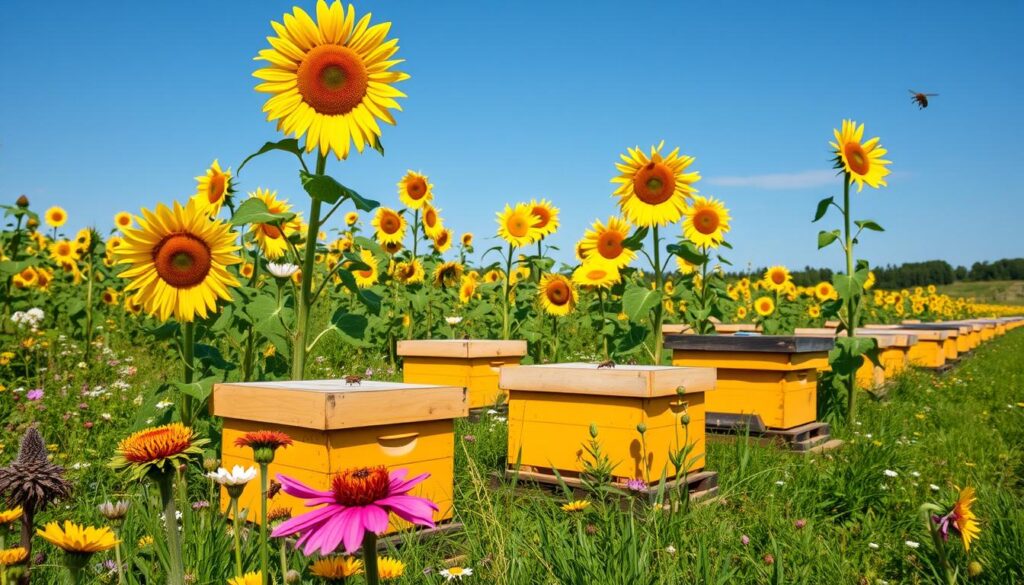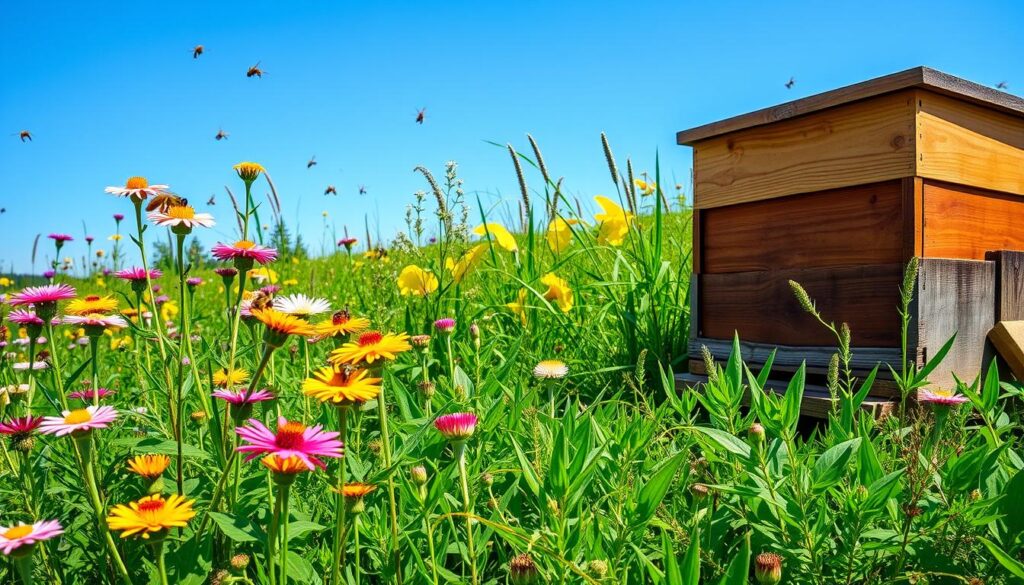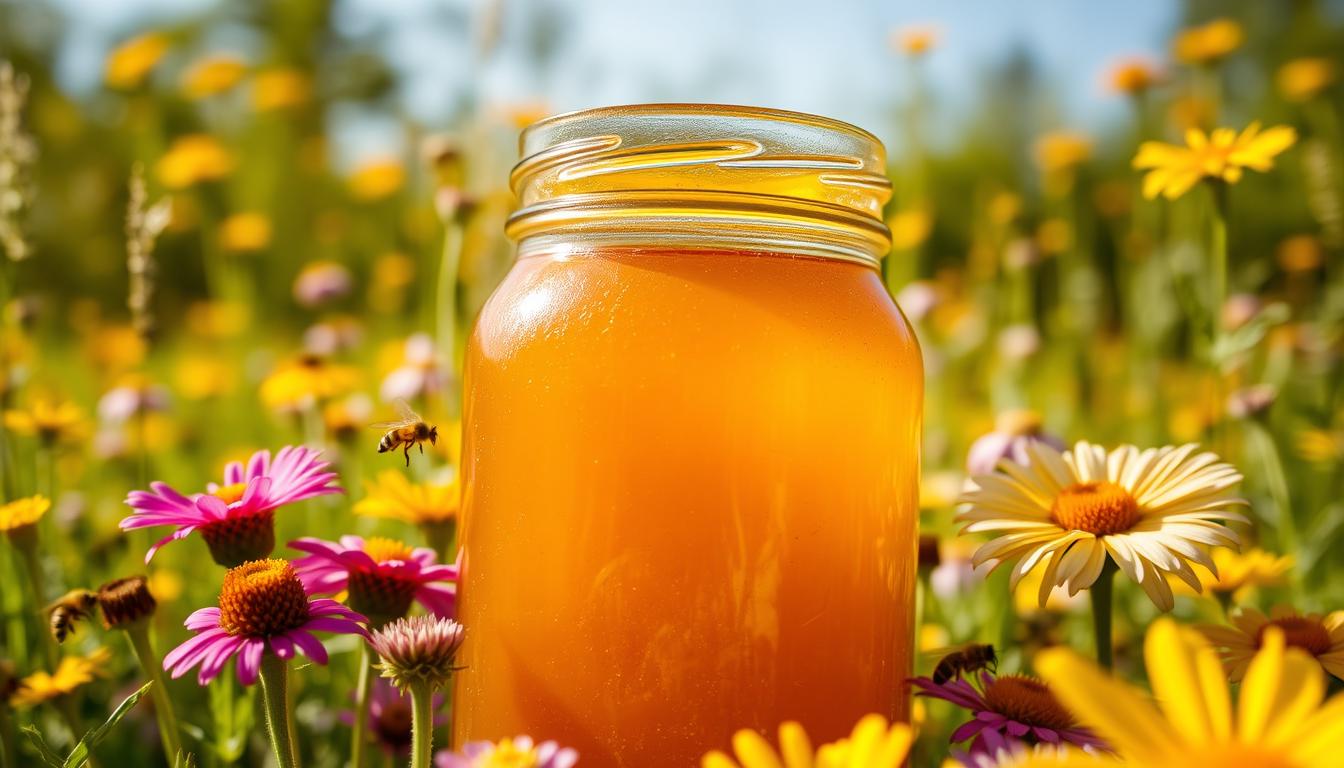In a world filled with mass-produced sweeteners, have you ever wondered about the pure, natural delights that lie right in your own backyard? Introducing local honey, a true treasure trove of flavors and health benefits that can be found just a stone’s throw away. But what makes local honey so special, and why should you consider it as your go-to sweetener?
Key Takeaways
- Discover the unique flavors and characteristics of local honey
- Understand the benefits of supporting your local beekeepers
- Explore the artisanal world of raw and wildflower honey
- Learn about eco-friendly beekeeping practices and sustainability
- Uncover the health and wellness properties of local honey
Discovering the Sweetness of Local Honey
When it comes to honey, local varieties offer a unique and captivating experience. Unlike mass-produced honey that often lacks distinct flavors, local honey reflects the diverse floral sources found within your community. From the delicate notes of wildflowers to the rich, robust tastes of nearby orchards, each jar of local honey tells a story of the land and the hardworking beekeepers who harvest it.
What Makes Local Honey Unique?
The secret to the distinctive flavors of local honey lies in its immediate surroundings. As honeybees forage for nectar within a few miles of their hive, they gather pollen from the specific plants and flowers that thrive in your local ecosystem. This creates a one-of-a-kind honey profile that cannot be replicated elsewhere, making each jar a true reflection of your regional terroir.
The Benefits of Supporting Local Beekeepers
- Foster a Vibrant Local Economy: By purchasing honey from neighborhood beekeepers, you’re directly supporting small businesses and keeping your community’s economic engines running strong.
- Promote Sustainable Practices: Local beekeepers often employ eco-friendly methods that prioritize the health of their bee colonies and the surrounding environment.
- Connect with Your Community: Engaging with local honey producers gives you a deeper appreciation for the hard work and dedication that goes into cultivating these natural sweeteners.
When you savor the rich, complex flavors of local honey, you’re not just enjoying a delectable treat – you’re celebrating the unique character of your region and the passionate individuals who make it possible.
The Buzz About Raw Honey
In the world of natural sweeteners, raw honey stands out as a unique and impressive option. Unlike its commercially processed counterpart, raw honey retains its natural nutrients and beneficial properties, making it a true delight for health-conscious consumers.
What sets raw honey apart is the fact that it undergoes minimal processing, preserving its unique flavor profile and vital compounds. Unlike filtered honey, which can lose some of its nutritional value, raw honey is a testament to the hard work and dedication of local beekeepers who strive to provide a pure, unadulterated product.
- Raw honey is rich in antioxidants, enzymes, and a variety of vitamins and minerals, including vitamin C, vitamin B6, and iron.
- It has been shown to possess anti-inflammatory and antibacterial properties, making it a natural remedy for ailments such as sore throats and skin infections.
- Unlike refined sugar, raw natural sweeteners like raw honey have a lower glycemic index, which means they are less likely to cause spikes in blood sugar levels.
For those seeking a healthier and more authentic sweetening alternative, local honey is the way to go. By supporting local beekeepers, you not only enjoy the unparalleled taste of raw honey, but you also contribute to the sustainability of your local ecosystem.
“Raw honey is a true gift from nature, preserving the essence of the land and the hard work of our local beekeepers.”
Exploring Local Honey Varieties
Beyond the ubiquitous clover honey, the world of local honey offers a diverse array of delightful varieties, each with its own distinct flavor profile. As beekeepers tend to the needs of their hives, they unlock the secrets of the local flora, harvesting honey that captures the essence of the surrounding ecosystem.
Wildflower Honey: A Taste of Nature’s Bounty
One of the most captivating local honey varieties is wildflower honey. Unlike single-source honeys, which are derived from the nectar of a specific plant, wildflower honey is a harmonious blend of nectars collected from a variety of wild flowers and plants. This honey’s flavor can range from delicate and floral to bold and earthy, depending on the local flora.
Wildflower honey is a true reflection of the local environment, with each jar offering a unique flavor profile that changes with the seasons and the region. Beekeepers who specialize in producing local honey often take great pride in showcasing the diverse range of wildflower honey varieties available in their area.
| Honey Variety | Flavor Profile | Floral Sources |
|---|---|---|
| Wildflower Honey | Delicate to bold, floral to earthy | Varied local wildflowers and plants |
| Local Honey | Diverse, reflecting the local ecosystem | Native and regional plant life |
| Honey Varieties | Unique flavor profiles | Specific plant sources |
By exploring the diverse range of local honey varieties, consumers can embark on a delicious journey of discovery, uncovering the unique flavors that reflect the bounty of their local environment.
“Each jar of wildflower honey is a unique work of art, crafted by the industrious bees and the careful stewardship of our local beekeepers.”
Bee Farms and Apiaries: Where Local Honey is Made
Tucked away in the rolling hills and lush countryside, you’ll find the heart of local honey production – the bee farms and apiaries that give life to this natural sweetness. These sanctuaries of honeybees are the hidden gems where dedicated local beekeepers meticulously craft the pure, unadulterated honeybee products that grace our tables.
Behind the Scenes: The Art of Beekeeping
Beekeeping is a time-honored tradition, requiring a delicate balance of science and intuition. Local beekeepers, with their deep-rooted passion for these industrious insects, devote countless hours to tending their hives, ensuring the health and prosperity of their honeybee colonies. From carefully monitoring the intricate dance of the worker bees to harvesting the golden nectar, each step is a carefully choreographed dance, a testament to the skill and dedication of these unsung heroes of the bee farm and apiary.
The art of beekeeping is not merely a profession, but a calling. These stewards of the land cultivate an intimate understanding of the bees’ needs, creating environments that allow the honeybee population to thrive. Through their meticulous efforts, they not only produce the finest quality local honey, but also play a vital role in preserving the delicate balance of our ecosystem.

“Beekeeping is a dance between the beekeeper and the bees, a symphony of trust, respect, and a profound appreciation for the natural world.”
As you savor the pure, rich flavor of local honey, take a moment to appreciate the dedication and artistry of the local beekeepers who pour their hearts into every drop. Their unwavering commitment to their craft ensures that each jar is a testament to the beauty and bounty of the land they call home.
Artisanal Honey: A Delicious Craft
In the world of local honey, a new wave of artisanal producers is capturing the hearts and palates of discerning consumers. These passionate beekeepers are elevating the craft of honey-making, celebrating the unique flavors and qualities of artisanal honey. Their dedication to sustainable practices and meticulous attention to detail has transformed honey into a gourmet delight.
The rise of the local honey movement has coincided with a growing appreciation for artisanal food products. Consumers are increasingly seeking out sustainable honey that not only tastes exceptional but also supports the local economy and environment. Artisanal honey producers, with their small-batch approach and handcrafted techniques, are perfectly positioned to meet this demand.
From the carefully selected floral sources to the gentle harvesting and processing methods, every step in the creation of artisanal honey is infused with a sense of craftsmanship. These honey makers often work in harmony with the land, allowing the natural rhythms of the seasons to shape the unique flavor profiles of their products.
| Artisanal Honey Varieties | Flavor Notes | Floral Sources |
|---|---|---|
| Wildflower Honey | Floral, complex, and subtly sweet | A diverse array of wildflowers |
| Buckwheat Honey | Rich, robust, and slightly earthy | Buckwheat plants |
| Orange Blossom Honey | Bright, citrusy, and delicate | Orange blossom flowers |
The artisanal honey movement is not just about the end product; it’s a celebration of the entire process. Consumers are drawn to the stories behind these honey makers, their commitment to sustainable practices, and their passion for their craft. By supporting artisanal honey producers, we not only enjoy a delicious treat but also contribute to the preservation of a time-honored tradition and the well-being of local ecosystems.
“Honey is the only food on the planet that will not spoil or rot. It will do what it needs to do, and it will survive.”
– -Beekeeper, Mike McInnes
Sustainability and Local Honey Production
In a world increasingly focused on environmental conservation, the production of sustainable honey has become a crucial consideration. Local beekeepers, committed to eco-friendly beekeeping practices, play a vital role in safeguarding the delicate balance of nature while providing communities with the delectable goodness of local honey.
Eco-Friendly Beekeeping Practices
Responsible local honey production begins with the adoption of sustainable beekeeping methods. Savvy beekeepers understand the importance of maintaining healthy, thriving bee populations, which in turn support the growth of diverse plant life and overall ecosystem health. By eschewing the use of harmful pesticides and chemicals, they ensure that their apiaries remain free from toxins, allowing bees to thrive in a natural, chemical-free environment.
- Utilization of natural, organic hive management techniques
- Careful selection of bee-friendly plants and flowers to cultivate in their apiaries
- Commitment to ethical, humane practices that prioritize the well-being of their bee colonies
These eco-friendly practices not only benefit the bees but also contribute to the preservation of local biodiversity, making sustainable honey production a true win-win for both the environment and the community.

“Sustainable beekeeping is not just about honey, it’s about safeguarding the delicate balance of our ecosystems for generations to come.”
By supporting local honey producers who embrace eco-friendly beekeeping, consumers can feel confident that their purchases are making a positive impact on the environment and their local community.
Local Honey: A Natural Sweetener for Health and Wellness
In today’s health-conscious world, the search for natural sweeteners has become increasingly prevalent. One such treasure lies in the heart of local communities – local honey. This pure, unprocessed nectar not only offers a delectable taste but also boasts a remarkable array of health benefits that make it a valuable addition to any wellness regimen.
Honey’s natural composition is a testament to its versatility as a natural sweetener. Rich in antioxidants, honey can help neutralize harmful free radicals, supporting overall cellular health. Additionally, honey’s antimicrobial properties make it a potent ally in combating bacterial and fungal infections, providing a natural way to boost the body’s defenses.
Beyond its direct health benefits, local honey also holds the potential to alleviate seasonal allergies. By consuming honey produced by local bees, individuals can expose themselves to the pollen from their immediate environment, potentially building up a natural resistance over time.
| Health Benefits of Local Honey | Potential Applications |
|---|---|
|
|
Embracing the power of local honey as a natural sweetener not only supports the local economy and sustainable beekeeping practices but also empowers individuals to take an active role in their own health and wellness journey. By incorporating this versatile ingredient into their daily routines, health-conscious consumers can unlock a world of natural benefits and transform their relationship with sweetness.
“Honey is the only food on the planet that will not spoil or rot. It will do what no other food will – it will just keep forever.”
Meet Your Local Beekeepers
Stories from the Hive
Behind the sweet, golden nectar of local honey lie the passionate individuals who dedicate their lives to tending to their bee colonies. Meet Michael and Sarah, a husband-and-wife duo who operate a thriving apiary in the heart of your community. With years of experience in bee farming, they take immense pride in their craft, sharing stories that shed light on the intricate world of beekeeping.
“Watching the bees work in harmony, flitting from flower to flower, is truly mesmerizing,” says Michael, as he inspects one of the hives on their local beekeepers‘ farm. “Each season brings new challenges, but the reward of seeing our customers enjoy the honey we’ve produced makes it all worthwhile.”
Sarah, Michael’s partner, echoes his sentiment, adding, “Being a beekeeper isn’t just a job – it’s a way of life. We’ve forged deep connections with our local community, sharing our knowledge and passion for these incredible insects. Our goal is to not only provide the finest quality honey, but to also educate and inspire others to appreciate the vital role bees play in our ecosystem.”

